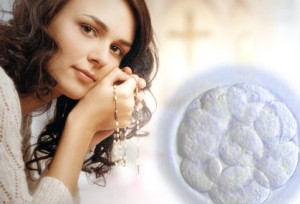Posts Tagged ‘religion’
Federal Funding of Embryo Donation and “Embryo Adoption:” Is it time for the Federal Government to Reconsider Its goals?

By: Craig R. Sweet, M.D.
Reproductive Endocrinologist
Info@EmbryoDonation.com
The “Defunding” of a Government-Supported Program
On March 2, 2012, it was reported that the Obama Administration wanted to defund the embryo donation/adoption awareness federal program that has been run by the Office of Population Affairs, part of  the U.S. Department of Health and Human Services. Spokespeople from Nightlight Christian Adoptions, the National Embryo Donation Center and Snowflakes Embryo Adoption programs were quoted as opposing the defunding decision. It should be noted they all had received or were receiving funding from the federal program, so their reactions were not unexpected.
the U.S. Department of Health and Human Services. Spokespeople from Nightlight Christian Adoptions, the National Embryo Donation Center and Snowflakes Embryo Adoption programs were quoted as opposing the defunding decision. It should be noted they all had received or were receiving funding from the federal program, so their reactions were not unexpected.
Initially, the federal program was created in response to President Bush’s push to use cryopreserved embryos to create families and steer away donations from human embryonic stem cell research. Since 2002, over 22 million dollars has been spent by the federal government on the awareness programs.
The Predictable Response
Certainly during an election year, the firestorm that followed was probably predictable.
There were calls stating that the Obama Administration was “pro-abortion,”
I’ve never met such a person in my entire life, although many have been “pro-choice.”
Congressman Chris Smith, a New Jersey Republican, was quoted a saying, “Assertions that leftover embryos are better off dead so that their stem cells can be derived is dehumanizing and cheapens human life.”
Come on now… this decision does not mean that all cryopreserved will be destroyed. It simply means that all of us who are dedicated to the concept of embryo donation need to work harder and smarter with non-federal funds to make certain patients are aware of the embryo donation option.
Mailee Smith, staff counsel at the “pro-life” Americans United for Life, was quoted, “What we’re seeing is the elimination of the moral solution.”
Nothing could be further from the truth. Many programs throughout the country offer embryo donation and will continue to do so long after federal funding disappears.
Could we all just trim the hyperbole a bit?
Is it a Coincidence that the Phrase “Embryo Adoption” Predated the Personhood Amendments?
I suggest paying less attention to the hype and instead examine the realities of the ways that federal funding can influence the competitive free market with unintended consequences. The propagation of the term “embryo adoption” sprouted the appearance of the personhood amendments and legislation, which are focused on declaring that eight-cell early embryos are people. The consequences of these enactments are far reaching, including monumental legislative changes, restrictions on the care of women, and severe restrictions to the treatment of the infertile patient. (See my previous blog on the Mississippi Amendment here.)
Not Sour Grapes but Concerns Regarding Discrimination
Let it be understood that Embryo Donation International (EDI) applied last year for the federal funding in question, but we were not awarded a grant. In partnership with professors at Florida Gulf Coast University, we proposed thirteen different fresh and innovative projects to increase awareness, as well as provide embryo donation services. While we were disappointed, we were not surprised that the organizations, for the most part, receiving funding had been granted it before and this was our first submission. EDI was not previously dependent on the funding so there were no significant changes in our day-to-day operations. The projects are slowly being rolled out, funded instead by SRMS/EDI.
What bothered us was that over the years some of the organizations receiving the bulk of the funding were faith-based and discriminated against some patients. While the projects themselves were potentially more neutral, the organizations were not. Health and Human Services (HHS) apparently looked only at the proposals in determining the awards, making the awarding of grants potentially flawed.
The grant process essentially compartmentalized the proposals. If an organization provided certain services, which the federal government did not fund directly, but the organization was awarded a grant to provide other services, the government essentially compartmentalized the grant money separate from the procedures it didn’t directly support. I understand the concept but do not feel the grant committees should have made the decision based only on the grant proposals. They also needed to take into account the overall views and beliefs of the organization requesting funding. There needs to be times when the government must look at the trees and not just the leaves.
I believe there were instances where the funds should be withheld. The funded organizations should have provided a minimum standard of practice guidelines in line with the non-discrimination clauses outlined in the grants. Entities awarded the grants should not have discriminated with regards to race, religion, ancestry, gender, marital status or sexual preference.
 Being a faith-based embryo donation/embryo adoption organization also directly or indirectly excludes some patients, making it uncertain if the federal government should directly support such facilities, especially taking into account the separation of church and state. I know that faith-based embryo donation/embryo adoption entities were strongly supported by past administrations but should a neutral organization that does not discriminate and makes all faiths feel totally welcome be placed at a higher priority now? Is this more ethical and fair? Is this a better use of the shrinking tax dollars? Is it time for the federal government to reconsider their goals?
Being a faith-based embryo donation/embryo adoption organization also directly or indirectly excludes some patients, making it uncertain if the federal government should directly support such facilities, especially taking into account the separation of church and state. I know that faith-based embryo donation/embryo adoption entities were strongly supported by past administrations but should a neutral organization that does not discriminate and makes all faiths feel totally welcome be placed at a higher priority now? Is this more ethical and fair? Is this a better use of the shrinking tax dollars? Is it time for the federal government to reconsider their goals?
If both discrimination and faith-based issues were actually taken into account, many of the organizations discussed here never would have received the original federal funds.
It is not that I want these organizations to go away. Quite the contrary, they often do a great job, provide excellent services and fill a much-needed niche. Their funding should, however, be through sources other than the federal government because of the bias inherent to their provision of services.
Can the Government Afford Providing the Grants?
Understanding that the U.S. is running a severe deficit, when are we ever going to be  willing to make difficult decisions? How are we ever going to get control of the budget if we can’t trim existing programs that may serve an important few when the many need assistance? We all need to look at the big picture and understand that “business as usual” is not practical in the current economic climate. I may be falling on the sword a bit, but shouldn’t we all be willing to sacrifice? Hey, I’m all for creating little taxpayers to help pay off the deficit. I’m just not sure that we can afford to do so through a government in the red. To do so with organizations that discriminate makes absolutely no sense at all.
willing to make difficult decisions? How are we ever going to get control of the budget if we can’t trim existing programs that may serve an important few when the many need assistance? We all need to look at the big picture and understand that “business as usual” is not practical in the current economic climate. I may be falling on the sword a bit, but shouldn’t we all be willing to sacrifice? Hey, I’m all for creating little taxpayers to help pay off the deficit. I’m just not sure that we can afford to do so through a government in the red. To do so with organizations that discriminate makes absolutely no sense at all.
In Summary
If federal funding is to continue, it needs to be provided to organizations, and not necessarily my own, which do not discriminate and are not faith-based. In addition, giving “embryo adoption” programs federal funds so they can support personhood amendments should be reconsidered. Having the government eventually spend even more money and time contesting the amendments and statutes in court defies understanding. Perhaps the congressional appropriations committees, who will make the final decision regarding federal funding, will take the concepts of non-discrimination and non faith-based alternatives into account and fund the programs with new and fairer goals.
Rest assured, unlike the rhetoric would lead one to believe, embryo donation is here to stay, regardless of the decisions of Congress and the grant process. How do we know? We’ve been providing the service for 11 years and will continue to do so in the years ahead, without cessation, as long as there are cryopreserved embryos available to donate.
Craig R. Sweet, M.D.
Reproductive Endocrinologist
Embryo Donation International
www.EmbryoDonation.com
Why the Catholic Debate Over the Morality of Saving Frozen Embryos Misses Some Important Points

By Dr. Craig R. Sweet
Medical & Practice Director
Founder, Embryo Donation International
I have welcomed and watched for some time the debate within the Catholic Church about the appropriateness of Catholics “saving” frozen embryos, which is a discussion that has seen a recent resurgence. I admire both sides of the debate: those who are interpreting steadfastly the teachings of the Church regarding in vitro fertilization, as well as those good people who want to give frozen embryos a chance of life.
Didn’t the Vatican’s Dignatias Personae settle the moral issue?
The 2008 Vatican document Dignatias Personae (The Dignity of a Person), which was intended to provide updated directives on biomedical ethical controversies, may not have settled this moral issue to the satisfaction of all. Because the Catholic Church believes in unconditional respect for all human life from the moment of conception, to some, these teachings seem to be at odds with Catholics who want to save frozen embryos. Both sides, however, are missing an important point.
 Why some believe embryo donation/adoption is morally wrong.
Why some believe embryo donation/adoption is morally wrong.
Let’s start with the perspective from those who feel it is morally wrong for Catholics to participate in IVF, embryo donation or embryo adoption. While not an expert in any aspects of Catholic theology, I will try to list what I believe are the important talking points:
- The Catholic Church feels IVF separates conception from the immediate act of sexual union between spouses while also improperly treating life as a commodity. IVF, therefore, is morally wrong and using fresh or frozen embryos created from such an act cannot be condoned or justified.
- A husband has a spousal right within the marital bond to his wife’s body and no one but the husband should impregnate his wife. In mutual respect, their bodies belong to each other and no other.
- Gestational surrogacy with donated/adopted embryos violates the covenant of marriage, as these pregnancies are not conceived through a natural act of conjugal love.
Some believe that IVF is morally wrong so using frozen embryos created via IVF cannot be justified.
Why some believe receiving a donated/adopted embryo is morally correct.
Next, let me next provide some of the arguments from those who feel that receiving donated embryos or gestating adopted embryos is morally correct:
- Keeping the embryos frozen indefinitely is an ongoing injustice and affront to the embryo’s dignity.
- Accepting donated/adopted embryos is similar to the adoption of a child, which is certainly encouraged by the church. Think of it as a “prenatal adoption”.
- A women who adopts and is able to breast feed a child, which is allowed by the Church, is providing nourishment. One can then surmise that carrying a donated/adopted embryo in the womb, thereby providing nourishment is no different.
- Surrogacy, under extreme circumstances, may be morally correct when a woman or the child would be severely harmed if the woman tried to carry and deliver a pregnancy.
- Pregnancy occurs without having sex with another, so the marital bond remains intact.
- Rescuing and receiving embryos ultimately protects the sanctity of life.
Others believe that life is sacred and that Catholics should be allowed to save frozen embryos.
Simply stated, those that believe it is immoral to receive donated/adopted embryos do not feel the ends justify the means when the means used, i.e., in vitro fertilization, is considered immoral. Those who believe gestating a donated/adopted embryo is moral ultimately feel the ends justify the means when the ends result in “saving” frozen embryos and building a happy family. This dilemma has divided a number of devout Catholics onto different sides of the debate.
What points are being missed in the debate?
Those against embryo donation/adoption also fear that the IVF industry will boom trying to resupply embryos. Nothing could be further from the truth. Frozen embryos are donated reluctantly with fewer than 10% donated to patients in need. Patients create embryos to build families of their own, not with the intent to donate or adopt. A boom will never materialize and is not a realistic concern.
Some also are concerned that embryos would be created and sold to the highest bidder. Embryos must always be created with patients in mind. If not, we could potentially have banks of unclaimed embryos, created from both donor eggs and donor sperm waiting to be chosen. Potential human life is never to be bought or sold or should be left unclaimed waiting somewhere in a liquid nitrogen tank. The creation and sale of embryos is clearly, no matter what your religion, ethically inappropriate and utterly unacceptable.
One could also argue that fertile Catholics, with potentially large families, shouldn’t have priority to the donated embryos over infertile couples who have never had a family. I can tell you this is an important point to hopeful embryo recipients who are desperately searching for the limited number of donated embryos and a chance to even have a single child.
What is the most important point I feel is being missed in the Catholic debate?
While it is wonderful to watch the Catholic Church discuss these issues in ways it has not done before, the truth is that they don’t need to have such angst. The unfortunate reality is that the number of potential (non-Catholic) recipients far outstrips the number of embryos available. Frozen embryos, which are not used by those that created them, don’t need to be saved; they simply need to be donated. There are literally thousands of recipients that will gladly take them without reservation. Nearly all donated embryos will find a home without good Catholics having to wrestle with this difficult moral decision.
I truly appreciate the conversation that wonderful Catholics have had within their Church regarding this issue. I have nothing but respect for those that are discussing their concerns. The sad truth is, however, that it is a moot point. From a practical perspective, we simply don’t have enough donated embryos to meet the current needs of the recipients who do not feel morally conflicted about the issue and who are not at risk from repercussions from a Church that maintains strong convictions. Perhaps if we significantly increase the number of embryos donated by decreasing the number abandoned or discarded, there would be a surplus of donated embryos and we would indeed need Catholics to rekindle the discussion.
To the good Catholics who are wrestling with this issue, feel free to keep the conversation going but be aware your participation, however welcome, thoughtful and well intended, is truly not needed to save the embryos you hold so dear. They are already spoken for.
Craig R. Sweet, M.D.
Reproductive Endocrinologist
Founder, Medical & Practice Director
Embryo Donation International
Info@EmbryoDonation.com
www.EmbryoDonation.com
References:
Gilbert, Kathleen. “Top Catholic Ethicists Duel over Frozen Embryo Adoption.” LifeSiteNews.com, US Edition. LifeSiteNews.com, 02 Aug. 2011. Web. 06 Aug. 2011. <http://www.lifesitenews.com/news/top-catholic-ethicists-duel-over-frozen-embryo-adoption>.
“Dignitas Personae (The Dignity of a Person).” United States Conference of Catholic Bishops. Department of Communications, United States Conference of Catholic Bishops. Web. 05 Aug. 2011. <http://www.usccb.org/comm/Dignitaspersonae/>.
[English/Spanish translations with other excellent pdf files]
Napier, Ph.D., Stephen, and John M. Hass, Ph.D., S.T.L. “Commentary on Dignitas Personae – The National Catholic Bioethics Center.” Home Page – The National Catholic Bioethics Center. The National Catholic Bioethics Center. Web. 03 Aug. 2011. <http://www.ncbcenter.org/page.aspx?pid=1010>.
Oleson C. Digitas personae and the Question of Heterologous Embryo Transfer. The Linacre Quarterly 2009;76(2):133-149.